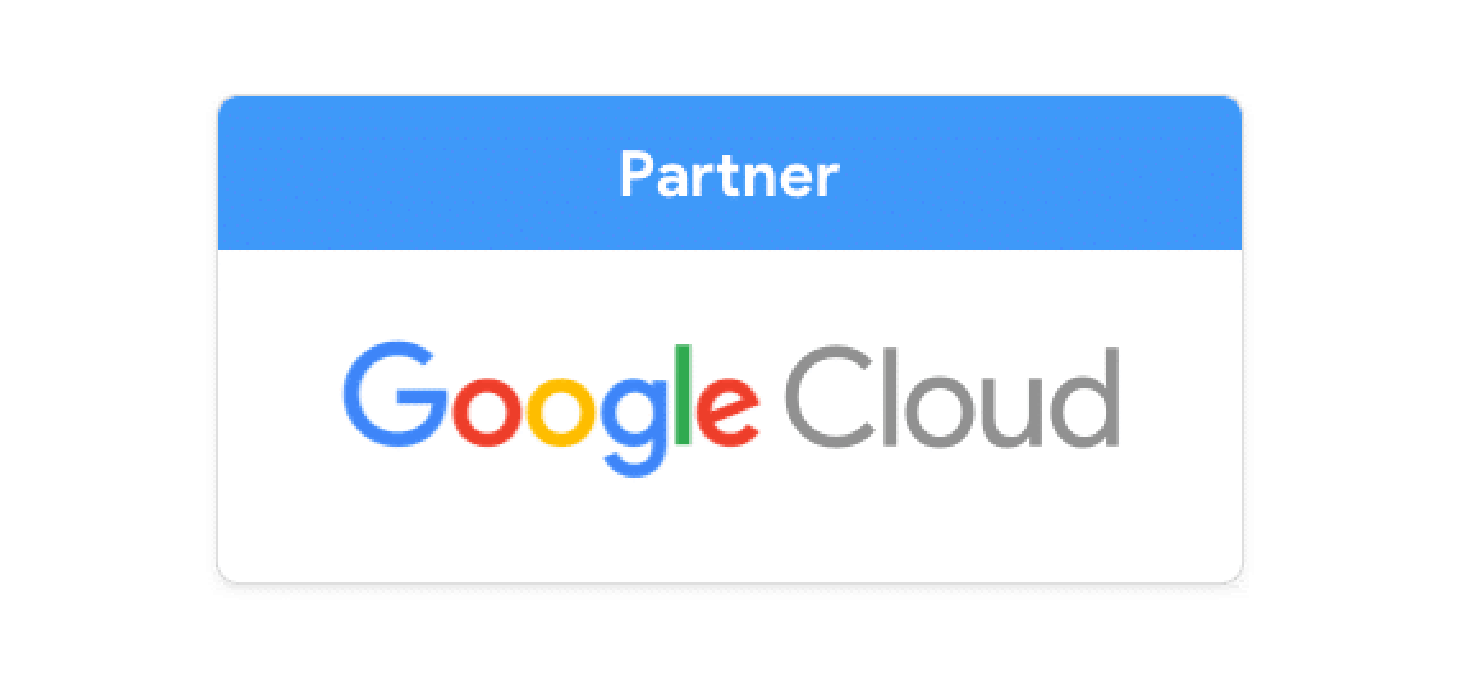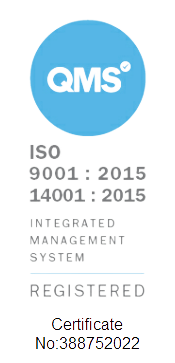Analysts report that by 2021, a ransomware attack will take place every 11 seconds. If you are one of the many professionals that don’t feel prepared for such an attack, or you are worried about your organisational data, this is the guide for you. Basically, - you should have some sort of data backup.
The purpose of this article is to explain everything you need to know about the Google Workspace (formerly G Suite) data backup tool, Afi. From discussion around what a backup tool is, why it's important and how Afi stands out in the market; it is designed to aid you overcome your data protection concerns.
Contents
- Introduction
- What is Afi?
- What is Ransomware
- The Problem with current solutions
- Versioning
- Drive File Retention
- Why Afi?
- Data Restoration with Afi
- Conclusion
Introduction - what is data backup?
Most organisations that use on-premise email and collaboration tools rely on backup software to protect their systems from hardware failures, malware, mistakes and malicious insiders. When businesses migrate from on-premise email to Google Workspace (formerly G Suite), they face the decision whether they need to back it up in the same way they protected their on-premise data. Whilst Google Workspace offers embedded data protection settings and experiences downtime that rarely amounts to minutes per year; there are times where this is insufficient and a 3rd party backup tool, such as AFI, is essential. In this article, we discuss relevant risks to your Workspace data and how they can be addressed by Afi.

What is Afi?
Afi is a modern and reliable data management and protection solution for cloud IT environments. Launched in 2017, it became the youngest Google Workspace (formerly G Suite) backup vendor, and differentiated itself from competitors by leveraging AI to automate data protection. Essentially, using Afi protects and restores organisational data which may have fallen victim to ransomware, deletion mistakes or malicious treatment.
What is Ransomware?
The threat of ransomware is probably the most frequent motive to look for a data protection solution. The malicious software is designed to block access to organisational data until a ransom is paid.
Positively, in the first half of 2020, no Afi customers experienced a ransomware attack affecting their Google Workspace data. However, industry analysts have reported the emergence of new types of ransomware that target cloud data sources.
It is important to understand that ransomware cannot be executed and run directly in your Google Workspace environment. It instead infects your users’ devices and encrypts data on their machines. Drive File Stream can then sync the changes and therefore encrypt the versions of the files stored in Google Drive and Shared Drive. Malware often uses local shared file servers (NASes, SMB shares) to infect as many machines as it can. Unfortunately, this means that the collaborative nature of Workspace which is so advantageous to business, can aid in ransomware being more widely spread. Thus, a potent backup tool such as Afi is essential in order to protect your organisation's data.
The problem with current solutions
Third-party G Suite backup solutions appeared almost at the same time as Google Workspace (then G Suite) in 2006. Google Workspace ( formerly G Suite) backup companies were originally founded in 2008. Many of the 20+ G Suite backup options have significant limitations related to the service reliability, backup or recovery speed, and the backup data immutability. In the following section, we focus on the limitations of Native Google Workspace Recovery compared to Afi solutions.
Versioning
One important anti-ransomware capability embedded in Google Workspace is versioning. It enables IT administrators to recover the last 100 versions of Google (Shared) Drives files. If a ransomware attack is discovered soon enough, Workspace administrators can use Versioning to restore the data. However, this strategy involves a lot of heavy manual labour (especially if you have a complex directory structure and many files). This means you would need to manually review file versions and recover them one-by-one.
Drive File Retention
Google Workspace provides Drive files retention capabilities which help administrators recover files within 25 days after they are permanently deleted (i.e. deleted from the Trash folder). Whilst this offers some protection against mistakes, it only really serves as beneficial if the missing files are noticed early.
Why Afi?
Afi partners with Cobry to deliver the next generation of Google Workspace backup service with over 10 unique features and 2-3x faster and more reliable service than legacy backup tools. Afi helps to overcome the limitations of the embedded Workspace data protection features by providing customisable unlimited data retention and automated restore options that accelerate the recovery. What's more, Afi is the only backup vendor with full-text search. This makes it easier to search for email data contents such as subject or name and quickens your back up. Finally, unlike other backup tools, Afi is proactive, not reactive. This means that it performs pre-emptive backups in case of ransomware attacks.
Data Restoration with Afi
This is a step-by-step guide on how to restore a users data on Afi. Firstly, click on the user whose data you would like to restore.
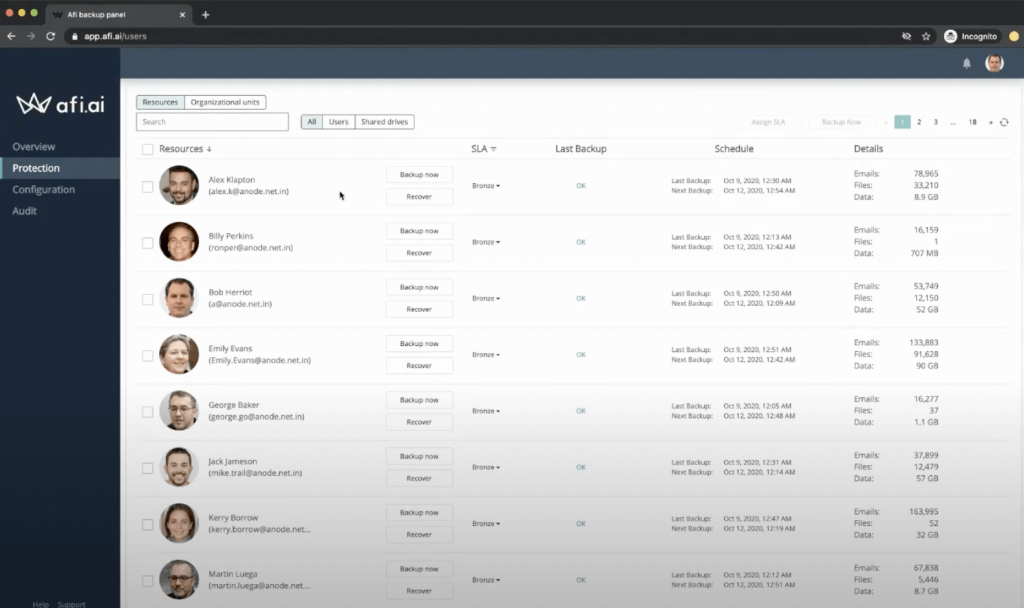
Then, select the file that you would like to restore.
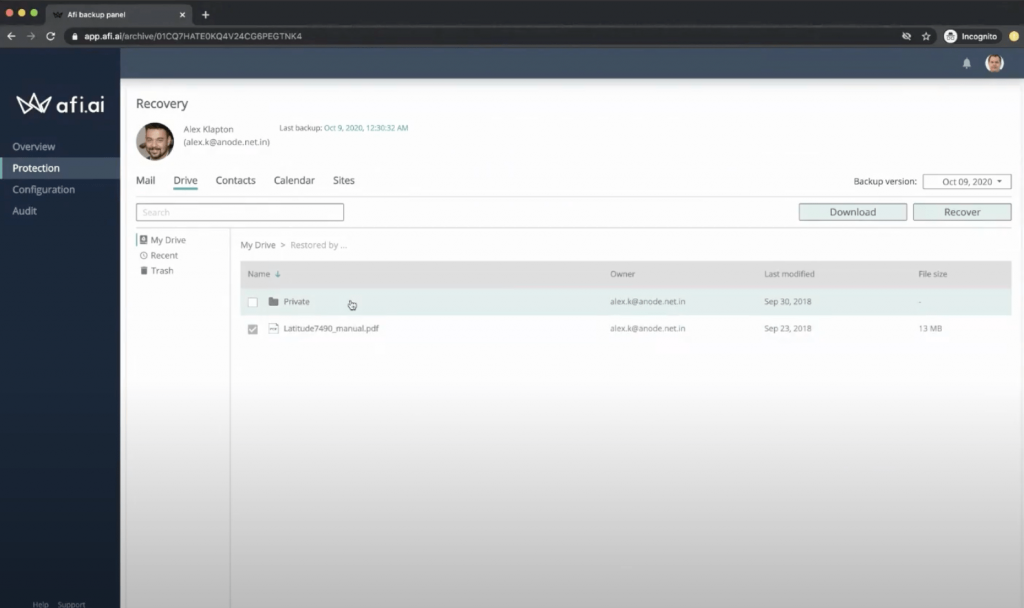
Finally, click the restore button, which will restore your data to your Google Workspace account. If you would like to download the data to your local device, click the download button.
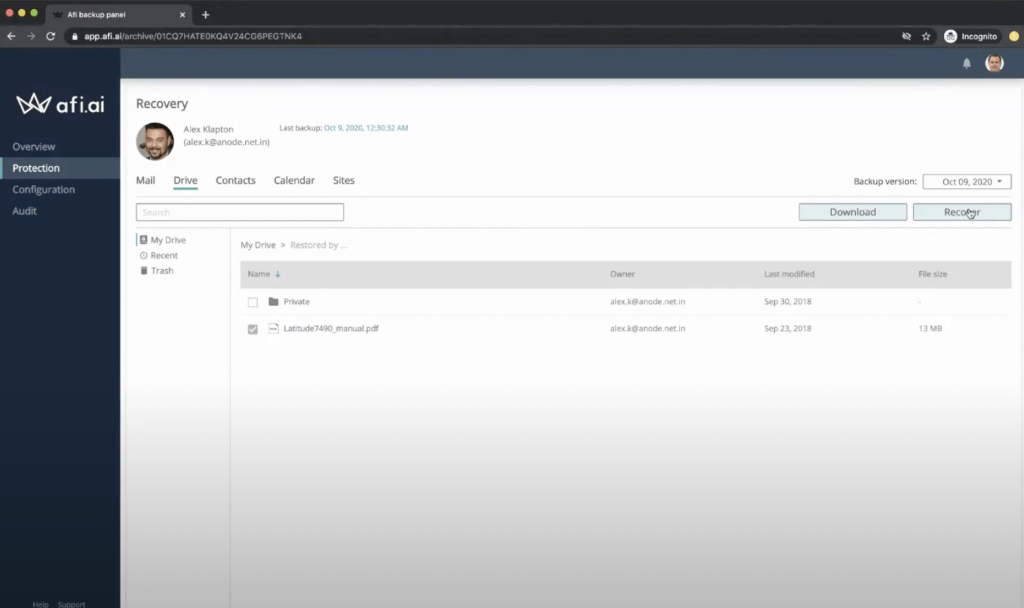
Conclusion
To conclude, a data backup solution is imperative for data protection and restoration in any organisation. Afi has time and time again proved itself as a leader in this field through its considerably faster and more reliable service than legacy backups. Start your data protection program by Getting in touch with Cobry, Afi's trusted Google Workspace partner, or drop your email down below and we'll get back to you in a jiffy!






